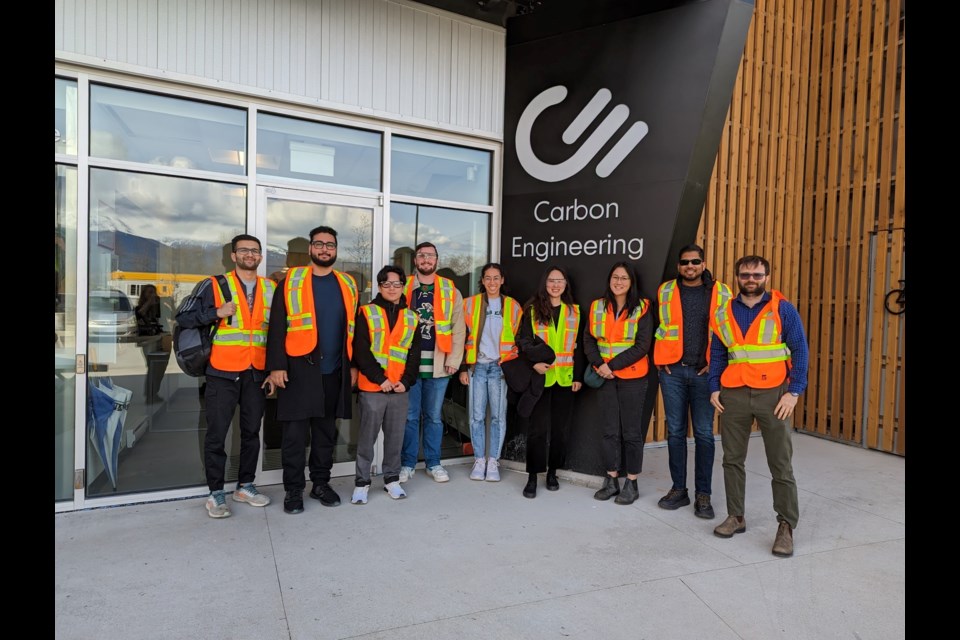Squamish's firm and its technology is featured in a course offered in Surrey.
Assistant professor Sami Khan teaches "" at SFU's S.
"This course presents the philosophy and procedures of chemical engineering and process design as applied to sustainable energy systems with a particular focus on designing the next generation of carbon capture systems,"
The program was last offered in the spring and next summer there will be a graduate equivalent called "Advanced Carbon Capture Engineering" that will be primarily offered to masters and PhD students in sustainable energy engineering, but will also be open to undergraduate students.
As part of the course in the spring, Khan brought students to visit Carbon Engineering in April.
Khan said the climate emergency inspired the course.
"Carbon emissions and the current levels of CO2 (carbon dioxide) in the atmosphere which [are] simply too high at the moment ... We've seen an increase from the Industrial Revolution. steadily. So ... the motivation for the course [is] what can we do to reduce these levels,” he explained.
Khan noted that plants and trees harness CO2 every day, but if humans can do it on a grand enough scale to reduce levels to what they were before the Industrial Revolution, "then that could mitigate the impacts of the climate events we're seeing."
Lori Guetre, CE’s vice-president and head of business development told The 撸奶社区 that Carbon Engineering believes that solving climate change will require an “all of the above” approach.
“Including both direct air capture and point source capture,” she said in an email.
“We’re delighted to see leading universities like SFU create new schools like the School for Sustainable Energy Engineering and new courses to zero in on carbon capture. The world needs the brightest minds on climate. CE is regularly hiring in Squamish; local education provides the potential for new research as well as trained students.”
Not new
The ability to capture carbon from the atmosphere using industrial means has been around for many years, but the concept is now gathering steam, Khan said.
"Specifically with Carbon Engineering, they're doing direct air capture … of CO2," he said.
"And this technology is quite exciting. ... Currently, the International Energy Agency has predicted that carbon capture facilities around the world are going to be growing to meet the net zero levels globally. So, the Carbon Engineering facility is one such example."
Khan noted there are also carbon capture facilities in Iceland and other countries that are growing.
Still, there is room for technological improvements, he added.
" and that's what I do in my research lab here at SFU," he said.
But wait, what is carbon capture?
Basically, the goal of carbon capture is to remove CO2 from the atmosphere in a gaseous form and put it somewhere else.
"We need to have something that is able to capture the carbon," Khan said.
The way to understand how carbon capture technology works is to imagine how sticky glue tape catches and traps an object.
"Let's say it's capturing a piece of paper, and then it is holding onto that," he said.
When it comes to capturing CO2, the materials that function similarly to the sticky glue in this analogy, and can hold onto carbon, can be separated into solids or liquids.
Squamish's Carbon Engineering uses the liquid method.
Opposing views
As part of the SFU course, students also look at what skeptics say about carbon capture.
Some claim it is too expensive a technology, while others argue it allows the oil and gas sector to point to carbon capture as the primary solution to climate change — one that would allow for continued reliance on fossil fuels — rather than investigating other forms of clean energy.
Khan's response?
Society has to do whatever it can to combat climate change by bringing the levels of CO2 in the atmosphere down and carbon capture does exactly that, he said.
"And at the same time, important policies are needed going forward for the regulation for oil and gas,” he added. “So, understanding that there are clean energy technologies and alternative means of renewable energy that can provide the demands that society needs for transportation and electricity."
Khan said he also tells his students about other essential products the oil and gas industry provides, such as the polymers used to make furniture.
Medicines, including life-saving ones — penicillin and cancer-fighting drugs, for example — are also made from petrochemicals.
Find out more about the course on .
Khan said he is looking to match his students with internship placements in the clean tech industry, or in decision-making departments within municipal or provincial governments.
Bookmark squamishchief.com so you can return for more local stories like this. Get 撸奶社区news daily in our free newsletter. Sign up here.





